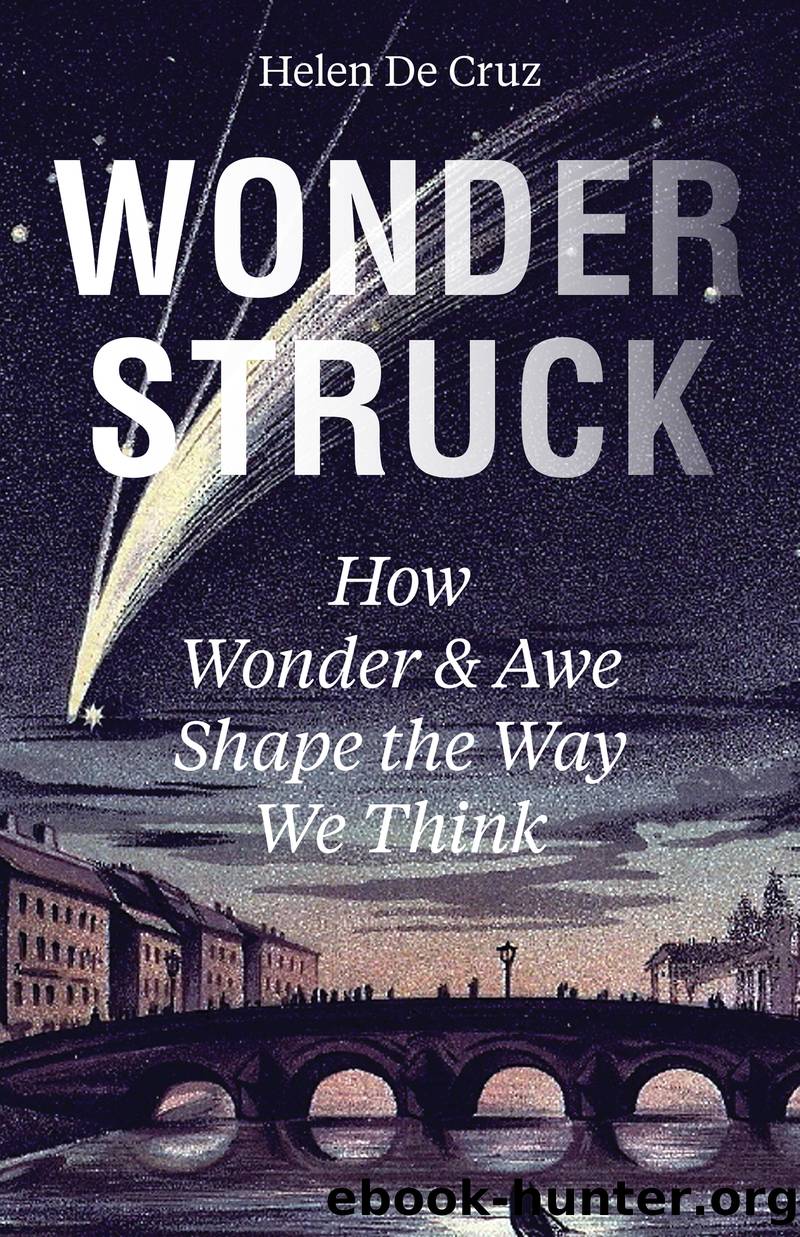Wonderstruck by Helen De Cruz;

Author:Helen De Cruz;
Language: eng
Format: epub
Publisher: Princeton University Press
Published: 2023-12-21T00:00:00+00:00
Religion and the Skill of Seeing with Firstness
The idea that religious belief-formation draws on skillful practices was explored by William Alston.37 He discussed the role of doxastic practices (practices that help us to form certain beliefs) in mystical perception. While doxastic practices are, for him, generic high-level processes such as visual perception, we can see that more deliberate and religion-specific practices are crucial to mystical experience. The latter form an integral part of the contemplative life, as is clear in the writings of the Catholic nun Teresa of Ãvila (1515â1582) and the Sufi master Ibn Tufayl (ca. 1110â1185). Both mystics describe perceiving God as a gradual journey of spiritual discovery that requires discipline and training. Teresa likens the soul of the believer to a castle with layers of inner courts that one can enter through spiritual training.38 Ibn Tufayl tells the parable of a young boy living on a desert island, brought up by gazelles, who discovers all by himself halal dietary restrictions, long periods of contemplation (tafakur), and Sufi physical exercises, and thus comes to experience God.39
Contemplative practices like these are all too often discarded as a waste of time. At best, theyâre reduced to mind-hacks or productivity enhancers, divorced from their spiritual and metaphysical roots, as in the case of Zen meditation or Stoic spiritual exercises as touted by wellness gurus. It would be an impoverishment, though, to reduce contemplative practices to mere means to fulfill our role in producing work or capital. Rather, some of these religious practices aim at rediscovering our sense of firstness by making us again receptive to awe and wonder. In a sense, you habituate yourself in order to dishabituate yourself.
How can religious practices awaken a sense of wonder? As we saw earlier, our habits make some aspects of our environment jump out at us, helping us to shape our decisions, and hence our agency. We can perceive a musical instrument as for-playing if we create a habit of practicing regularly. But seeing with awe and wonder is seeing something ânot-for-something.â It takes the object or event as it is, meeting it on its own terms, allowing it to change us and, particularly, our frame of reference. Recall that for Descartes, awe and wonder occur when we encounter an object before we have decided how we will use it, or even whether we should be happy about it, or dislike it. Heschel suggests that religion, such as the Jewish practice of blessings, allows us to recover this sense of firstness. There are blessings for a wide range of occasions, even for receiving bad news: âBaruch dayan haâemetâ (Blessed is the True Judge) is said upon hearing exceptionally bad news, often someoneâs death. There are also blessings for mundane pleasures, such as when eating fruit or vegetables. These blessings help us to recover a sense of awe and wonder at getting nourishment, and open the mind beyond a simple utilitarian perspective on food. The blessings do not guarantee that we greet these eventsâhearing news, eating food, seeing beautiful thingsâwith awe and wonder.
Download
This site does not store any files on its server. We only index and link to content provided by other sites. Please contact the content providers to delete copyright contents if any and email us, we'll remove relevant links or contents immediately.
Should I Stay or Should I Go? by Ramani Durvasula(7432)
Why We Sleep: Unlocking the Power of Sleep and Dreams by Matthew Walker(6362)
Fear by Osho(4496)
Flow by Mihaly Csikszentmihalyi(4493)
Rising Strong by Brene Brown(4193)
Why We Sleep by Matthew Walker(4192)
How to Change Your Mind by Michael Pollan(4115)
Too Much and Not the Mood by Durga Chew-Bose(4096)
The Hacking of the American Mind by Robert H. Lustig(4090)
Lost Connections by Johann Hari(3927)
He's Just Not That Into You by Greg Behrendt & Liz Tuccillo(3716)
Evolve Your Brain by Joe Dispenza(3506)
The Courage to Be Disliked by Ichiro Kishimi & Fumitake Koga(3261)
Crazy Is My Superpower by A.J. Mendez Brooks(3207)
What If This Were Enough? by Heather Havrilesky(3199)
Resisting Happiness by Matthew Kelly(3197)
Descartes' Error by Antonio Damasio(3167)
The Book of Human Emotions by Tiffany Watt Smith(3145)
In Cold Blood by Truman Capote(3140)
